
Beyond: Two Souls Review
Beyond: Two Souls is a puzzle, in more ways than one. It takes time and dedication to analyse, but ultimately leaves you with a beautiful picture and you enjoy a unique journey on the way.
From the minds behind Heavy Rain, Quantic Dream have created a new... game that is truly different to the majority of products available on the entertainment market at the moment. The reason for the trepidation behind the word ‘game’ though, is that Beyond: Two Souls is really more, and less, than that. Sure there are game elements, but David Cage (CEO of Quantic) has set out to produce a cinematic experience, and been nothing short of roaringly successful in doing so.
Off the bat, it is worth emphasising that if you’re expecting a super-interactive game with lots of action and button-mashing, then you will be disappointed. Keep in mind that this is more of an interactive movie with gaming elements and you will be thoroughly entertained.
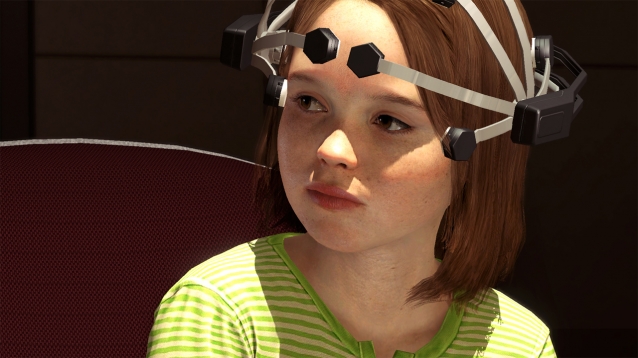
Beyond: Two Souls is the story of Jodie, a special girl with a strange gift. Since birth she has been linked with an entity, Aiden, who she cannot get rid of, and who protects her from “the monsters” from the Infraworld. Aiden, being his own character, has a tendency to act out, interacting as best he can with Jodie’s surroundings, much like a poltergeist would.
Due to the strange goings on that surround the two, Jodie is studied by Dr. Nathan Dawkins, who wants to learn more about Aiden; what he’s capable of, where he comes from, and the knowledge he could unlock for humankind.
Beyond follows the life of Jodie, jumping in and exploring events that take place from when she is a young child, up until adulthood. You piece together these important happenings into the great aforementioned puzzle in order to understand Jodie’s history, and what it means for the future.
Upon loading the game, it is instantly obvious that the graphical standard of Beyond: Two Souls is above and beyond anything else the PlayStation 3 can run at this time. Apparently this is due to some of the technology used in the development of the PlayStation 4 being applied to this; giving more depth to shadows; variance in the way light reflects on different surfaces and many other small tweaks that overall create an outstanding visual experience. Facial expressions are truly believable and in combination with the voice acting, do oodles for character attachment and keeping interest in the story.
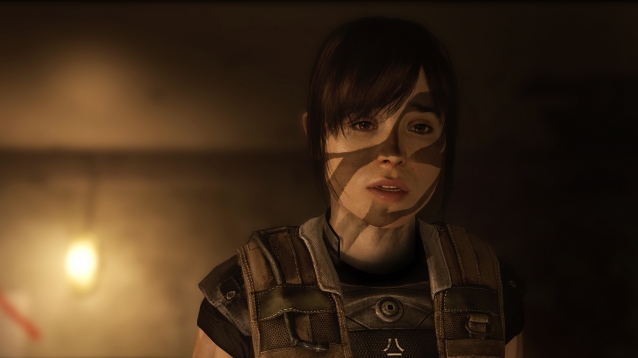
Speaking of voice acting, this is where the game really shines through. The incredible Ellen Page is the voice behind Jodie and kudos should be given to her here because her performance is flawless. It is truly a testament to an actor’s talent when you can feel every tiniest inflection of emotion and have your heartstrings pulled by just their voice. To be quite honest, she completely makes this game, showing what an extraordinarily gifted woman she is.
Other voices in the game are of a very high standard; Willem Dafoe as Dr. Nathan Dawkins is the most excellent in his role as father figure turned power-hungry scientist and the many other characters are well done, drawing you in or pushing you away according to the plot. The attention to detail when it comes to sound is also notable, with Jodie’s shivering breathing in the cold spreading the chills through the controller up my fingertips and prickling goosebumps all over my skin as just one example.
When it comes to gameplay, there is no heads-up display on top of the scenes; with merely small white dots indicating interactive aspects in your environment. Approaching these dots and moving the right analog stick in the direction that feels natural, ie. forward to open a door, or up to leave a seat allows this interaction to be as unobtrusive and seamless as possible. It feels similar to Telltale’s The Walking Dead but with even less on-screen direction.
As Jodie learns to do new things, a small directional picture will appear, explaining what to do and then you are on your own afterwards. This might seem like a stressful move for the more forgetful amongst us, but really, everything is so basic that it all actually comes fairly naturally. By working in combination with Aiden, who as an entity is able to invisibly explore and interact with objects, there is a real variety of ways to advance through the game, depending on how you choose to do things. This is a fascinating way of playing, and keeps you on your toes whilst still remaining accessible.
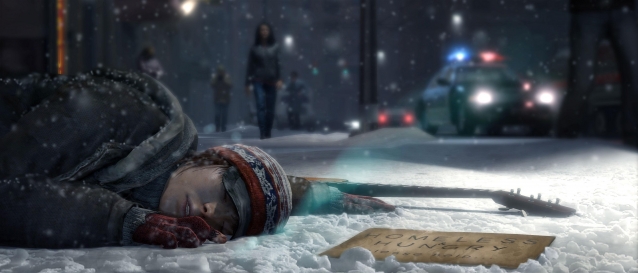
On the flip side, there are some elements to the game that are less than perfect and this occurs predominantly during combat sequences, which to be honest are rather few and far between. These moments are Quick Time Events (or QTEs) and consist of a combination of slow motion scenes and some button mashing to accomplish actions. Whilst the latter is fairly straightforward (hammer x to shake off attacker) the slow motion is where it gets tricky.
The idea is that when time slows, you move the right-analog stick in the same direction that Jodie’s body is travelling to complete the moment. For example if Jodie’s arm is moving in to punch an enemy in the face, you tap the stick in the direction the hit is being thrown for it to actually land. If the situation is reversed and you are the target of an incoming blow, you move in the direction Jodie is travelling to block or dodge it. The problem with this system is that often it is unclear as to which direction you are actually supposed to act, and consequently you end up seriously beaten, or looking like the worst fighter of all time.
Of course, as the story behind the game is somewhat linear, no matter what your actions are, or how rubbish you are during combat sequences, generally the result is fairly similar. Even if you end up in a situation that could have been avoided, the plot must move on, and so Jodie finds a way out of it with or without the help of Aiden.
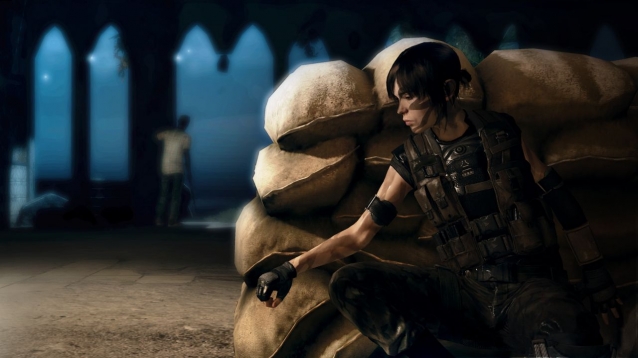
Whilst it could be said that your actions have no real effect on the plot of Beyond, I think the real importance here lies in your personal experience of it. Yes ultimately everyone ends up at the same destination more or less, but the difference in your particular journey and the choices you make on the way, cause it to be very special and intimate to you.
This is one of the aspects of the game that really stood out for me. Many of the decisions in the game are very small, seemingly insignificant things that appear to have no real meaning in the big picture, but their integration is actually very clever. These small choices, like what items to take with you when you are packing your bag, or what outfit to choose before a romantic evening are so very normal and so very unintimidating, that you allow your guard down and make the decisions based on what you would do if that situation arose in reality. This heightens your connection with Jodie and makes you even more invested in her story, because you feel so close to what is happening.
Overall, Beyond: Two Souls is a great cinematic game, and really an unmissable experience for anyone who enjoys a strong plot, because David Cage has done just a remarkable job with this. If you like your games with a lot of pew pew and shooty shooty then you may not get the most from it.
Beyond: Two Souls (Reviewed on PlayStation 3)
Excellent. Look out for this one.
Fantastic cinematic experience for plot-heavy fans, you're not going to appreciate this if you want lots of action.





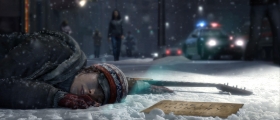




COMMENTS